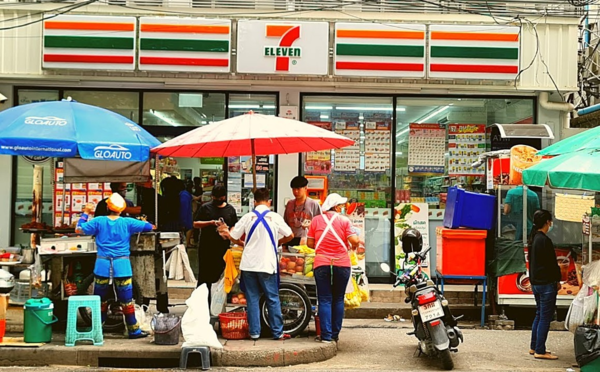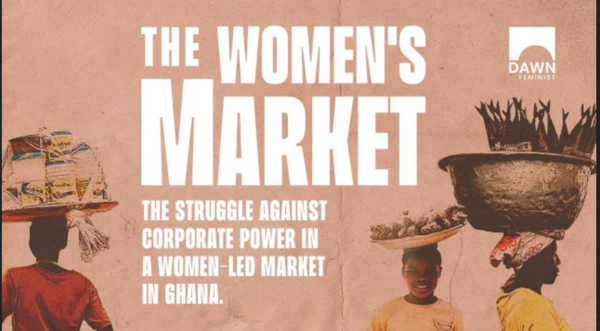Editorial
During a session of the United Nations Codex Commission on Food Hygiene in November 2022, a decision was taken to developed proposed guidelines on food hygiene control measures in traditional food markets. The Codex Alimentarius Commission is a joint FAO and WHO food standard programme. The guidelines proposal uses the term ‘traditional markets’ referring to spaces for food wholesalers, retailers and consumers to sell and purchase food for direct consumption, food preparation and other uses. There are many other names to call such markets, such as 'street food markets', 'local markets', 'public markets', 'community markets', 'municipal markets', 'open-air markets', 'wet markets' and 'farmers’ markets'.
The guidelines aim to regulate food safety and hygienic handling activities relevant to food sold at traditional markets whether it is raw, prepared and /or ready-to-eat, but exclude foods sold in supermarkets and animals sold alive.
Traditional markets are an important space and source for lower-income populations to access fresh, highly nutritious foods such as fresh fruits and vegetables, and they are a vibrant feature of nearly all Asian communities. They are also an important source of livelihood for small food producers and others working in food distribution. According to the FAO and WHO themselves, an estimated 2.5 billion people eat street food worldwide every day, providing a dignified source of income for a vast number of people, particularly women.
Given the large scope of traditional markets globally, important questions arise from this initiative. What would food hygiene control measures mean for the local traders and street food vendors, given that traditional markets and street vendors are mostly informal and unstructured.
According to Nash Tysmans, Streetnet Asia regional organizer, this technical document on food safety guidelines fails to consider social component and was developed without consultation with street vendors and market traders, despite that the implementation might bring consequences to these vendors. Tysmans added that street vendors understand the importance of food safety, but pushing a global standard like this neglect the diverse reality of street vendors and traditional markets around the world.
Traditional markets are often wrongly blamed for spreading diseases, from avian flu to African swine fever and even corona virus. But the findings from research around global livestock diseases for example contradict such unfounded claims, which are regularly promoted by food and meat companies and the international agencies. Traditional markets or farmers' markets tend to provide healthier, safer and more accessible food than supermarkets. They do so be relying on networks of trust, short circuits and long-standing local cultural practices-- not top-down, uniform standards. Any food safety guidelines for traditional markets need to be developed, first and foremost, with the people who work in these markets. Anything else will do nothing to improve food safety and will risk subjecting traditional markets to more unfair punitive measures, putting in jeopardy a critical source of food and livelihoods for billions of people.
Image: Sun sky market, Cambodia. Enric Català/StreetNet
Across the region
The myth of convenience: 7-Eleven’s monopoly on grocery stores in Thailand

The convenience store market is said to be growing 18% per year. 7-Eleven’s dominance largely relies on CP’s huge business empire, which leverages the group's diverse business interests that span agriculture, telecommunications, marketing, distribution, logistics and international trading. Thai cosumers are bombarded with advertisements promoting 7-Eleven and the products it sells. Another factor behind the growth of convenience stores is the increasing use of e-commerce platforms, digital payment systems, and loyalty programs that are not available with traditional, family-owned retail shops.
One of 7-Eleven's best-selling goods is its ready-to-eat meal line, which is becoming more popular among younger generations. CP Group has developed an extensive food factory business that produces a variety of ready-to-eat meals, with some of them available exclusively in the 7-Eleven chain. These days, one-third of 7-Eleven's product sales come from the fast food category, which has a higher gross profit margin compared to other non-food categories.
As more than 20 million Thai people visit a 7-Eleven each day, to do banking transactions, purchase consumer products and, increasingly, purchase foods, the growth of 7-Eleven is competing directly with local street food vendors, who have traditionally provided Thai people with a quick, affordable and nutritious source of ready-to-eat foods.
In Thailand, street stalls are a deeply ingrained part of the society. They can be seen in high-traffic regions, on the sides of streets and highways. These street vendors provide low-wage workers with affordable meals, the flexibility to customise cuisines to their preferences, and a taste of local food for communities. But Thailand's authorities have attempted to curb them in urban areas for decades, citing concerns about pedestrian traffic and health. At present, the soaring presence of 7-Eleven outlets, strategically occupying the high-traffic spaces that street vendors also seek, puts further strain on thousands of local food stores and street carts, forcing many of them to close. If the trend continues, the country stands to lose the authenticity of local communities through available street food options, hastening the decline of local street food culture in the urban areas.
To make matters worse, 7-Eleven's popularity has prompted numerous other businesses to replicate its model. Many gas stations, for example, now operate 24-hour convenience stores. Coffee, sandwiches, and ready-made meals are available at traditional grocery shops. This year, the CP Group announced plans to open 700 more 7-Eleven outlets in Thailand. The Group also intends to open more new stores in Cambodia and Laos.
7-Eleven and other convenience stores are not providing people in Thailand with better or more accessible foods. What they are doing is colonising the markets traditionally served by street food vendors, and destroying people's livelihoods in order to further enrich the country's billionaire families.
Image: 7-eleven stores in Thailand surrounded by street vendors. Creative common
___________________________________________
The women's market: the struggle against corporate power in a women-led market in Ghana

Step into the heart of Accra, Ghana and discover the untold story of how global macroeconomic policies crafted in the North affect not only women’s livelihoods but also their cultural and historical leadership role in one of Ghana’s busiest marketplaces.
The “Women's Market” is a powerful film that delves into the lives of women traders in the Dome Market as they navigate the complexities of economic hardship and public-private partnerships (PPPs).
Follow the transformation of the market, once a decentralised space of individual traders, into a battleground for economic justice. As the Ghanaian government implements a PPP initiative to modernise the market, promises of progress quickly give way to disillusionment as local traders are left struggling and unable to afford the new infrastructure.
As the PPP unfolds, it becomes clear that women, the backbone of the local economy, bear the brunt of its negative impacts. Displacement, rising costs, and unequal access to resources threaten their livelihoods and fracture the fabric of the market community.
But the women of Dome Market refuse to be silenced. Through protests, political engagement, and unwavering determination, they demand justice and fair treatment.
The film highlights the vital role of women in the market’s economy and their fight for economic autonomy in the face of adversity. It also deepens the understanding about the drivers and dynamics of PPPs, examining how Ghana's journey from a state-centric model to embracing collaboration with international financial institutions, including the World Bank and the International Monetary Fund, paved the way for the integration of PPPs into its development agenda.
Based on the groundbreaking research of feminist scholars Gertrude Dzifa Torvikey and Sylvia Ohene Marfo, "The Women's Market" is part of DAWN Feminist's multimedia project, "Old dog, new tricks: Neocolonialism & public-private partnerships in the global south.”
Watch the film here https://youtu.be/UhghqFrsIE4
To learn more about this project and other initiatives, visit www.dawnfeminist.org/projects/public-private-partnerships
Image: DAWN Feminist
From the news
Kiều Mai, Mekong Eye
The Cái Răng floating market was formed at the intersection of four rivers around the beginning of the 20th century as a trading hub for household items in the Mekong Delta. But infrastructure changes in the Mekong Delta river in the past decade have disrupted market activities and left many vendors – often women who carry significant family burdens – struggling to stay afloat. Since the embankment’s construction in 2016, 14 out of 18 fruit orchards that supplied the floating market have moved to other places closer to inland wholesale markets. Minh, a vendor and resident of the floating market for more than 20 years, has never witnessed such a bleak landscape. Without quick intervention, the Cái Răng floating market could become more desolate and may even disappear from the map of the Mekong Delta.
On 9 April 2024, Mapuche Indigenous People marched for food sovereignty and their ancestral rights in downtown Temuco, a city in the southern-central area of Chile. The demonstration was organised by mall vegetable and fruit producers and traders of the area, to denounce the persecution they have suffered by the authorities of Temuco, in collusion with the large supermarkets of the city.
Lawrence Bonk, Engadget
Amazon is removing Just Walk Out technology from all of its Fresh grocery stores in the US. The technology has been plagued by issues from the onset. Most notably, Just Walk Out merely presents the illusion of automation. While the stores have no actual cashiers, there are reportedly over 1,000 real people in India scanning the camera feeds to ensure accurate checkouts.
Takashi Kawakami, Nikkei Asia
China's food delivery market is expanding at a rapid pace even post-pandemic, more than doubling in the three years through 2023 to reach 1.5 trillion yuan (US$208 billion). While the industry is being built on the backs of low-paid deliverers, conditions remain harsh for gig employees whose numbers exceed a combined 10 million deliverers at two of China largest food delivery companies, Meituan and Ele.me.